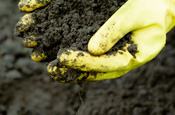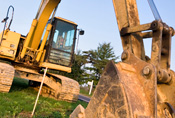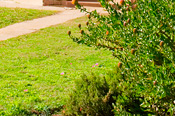Frequently Asked Questions
 What exactly is Project New Ground?
What exactly is Project New Ground?
What's the major goal of Project New Ground?
Why is health a concern?
Why is the health of children especially important?
Is the area's drinking water safe?
How can we be sure the health-improvement goals of Project New Ground will be met?
What will happen during the cleanup?
What areas of the city are involved?
How does the city know which properties need to be cleaned up?
How long will Project New Ground take?
If my property needs to be cleaned up, will I be able to remain in my home during the cleanup process?
Do residents need to give permission for the cleanup work to be performed?
When will my property be cleaned up?
Will removal of the soil create any health concerns?
Will Project New Ground cost residents any money?
What will happen to the soil that is removed from the Project New Ground areas?
What will my property look like after cleanup?
Who will be doing the actual cleanup work?
How much will the cleanup effort cost?
Have any other communities dealt with a similar situation?
How can residents stay informed about Project New Ground?
Who can I contact for more information?
What is the procedure for excavation near building foundations?
Do fruits and vegetables grown in contaminated soil pose a health risk?
 Q. What exactly is Project New Ground?
Q. What exactly is Project New Ground?
A. Project New Ground is a long-term cleanup project that resulted from an agreement between the City of Jacksonville and the U.S. Environmental Protection Agency (EPA). The agreement calls for the city to clean up the properties on which ash from waste-burning incinerators was deposited.
(Top of page)
Q. What's the major goal of Project New Ground?
A. The major goal is to protect the health of area residents and especially our children.
(Top of page)
Q. Why is health a concern?
A. Ash that was deposited in various parts of our city may cause health concerns for some residents today. Testing in the 1980s and 1990s revealed that some of the ash contained elevated levels of lead and could create potential public-health issues. According to tests conducted by the Duval County Health Department, no unusual levels of lead have been found in children who have been tested.
The Duval County Health Department has determined that health concerns are limited to children under the age of six. Project New Ground will reduce any potential threat to children by cleaning up the property and limiting future exposure.
If you have any specific questions about how ash on your property may affect your health, please contact the health department at (904) 253-1000. You may also visit the Duval County Health Department website, http://www.dchd.net/.
(Top of page)
Q. Why is the health of children especially important?
A. Children under the age of 6 are more vulnerable to elevated levels of lead than adults are. However, blood levels of lead among children tested in the Project New Ground areas were not found to be significantly elevated and are comparable to lead levels found throughout the county. Between August 1999 and April 2000, 349 area children were screened. Just five of them (1.4 percent) were found to have elevated levels of lead. And for two of those five children, the sources of the problem were traced back to the interiors of their homes. For the other three children, the sources could not be assessed. To have your child tested for lead, please contact your family physician or the Duval County Health Department.
(Top of page)
Q. Is the area's drinking water safe?
A. Yes. The quality of drinking water in neighborhoods surrounding area ash sites has been closely monitored since 1974. No contamination from ash sites has been detected in city water or private potable water wells. If you would like your well water tested, please call the Duval County Health Department at (904) 253-1282 to schedule an appointment.
(Top of page)
Q. How can we be sure the health-improvement goals of Project New Ground will be met?
A. Project New Ground will meet or exceed the strictest standards set by both the federal and state governments. These standards will help protect our children, which is the major goal of Project New Ground.
All work requires review and approval by the Florida Department of Environmental Protection, the U.S. Environmental Protection Agency (Region 4) and the U.S. Army Corps of Engineers.
(Top of page)
Q. What will happen during the cleanup?
A. Highly experienced companies who contract with the city will remove up to two feet of soil from the properties that have been tested and shown to contain ash. Then, the old soil will be replaced by clean soil that will be taken from a site that is certified as safe by the U.S. Environmental Protection Agency (EPA).
If your property requires cleanup, a city contractor will prepare an individual plan especially for your site and will show it to you before any work begins.
 |
 |
 |
|
1. Your soil will be tested. |
2. If ash is found, up to two feet of
soil will be removed and replaced
with clean soil. |
3. Your landscape will be restored. |
(Top of page)
Q. What areas of the city are involved?
A. There are four regions north and west of downtown that are part of Project New Ground:
Forest Street Study Area
-
290-acre footprint with 769 parcels
-
Site of incinerator operation from 1910 to the 1960s
Fifth and Cleveland Study Area
-
300-acre footprint with 930 parcels
-
Site of incinerator operation from 1910 to the 1960s
Expansion of Forest St., 5th St. and Cleveland Sites (OU2)
-
Forest Street - 164 parcels
-
5th and Cleveland - 539 parcels
Brown's Dump Study Area
-
250-acre footprint with 505 total parcels
-
Served as ash-deposit site from the late 1940s to the early 1950s
Lonnie C. Miller Study Area
-
250-acre footprint with 279 parcels
-
Served as ash-deposit site from the 1940s through the 1960s
It's important to note that ash was not deposited on every parcel of land within the four Project New Ground areas, so not all parcels will need to be cleaned up.
(Top of page)
Q. How does the city know which properties need to be cleaned up?
A. Each parcel within Project New Ground needs to be scientifically tested to see if it contains substances that may pose health concerns. But before testing takes place, property owners must give the city and its contractors permission to enter their property.
If your property has not been tested, please contact us or click here to download an access agreement.
(Top of page)
Q. How long will Project New Ground take?
A. Because Project New Ground is such an extensive project, it will not be finished overnight. Completing the job for all sites will take several years, and plans call for work to continue through about 2017.
(Top of page)
Q. If my property needs to be cleaned up, will I be able to remain in my home during the cleanup process?
A. Yes. Cleanup on each property should take approximately five days. During that time, you are welcome to remain in your home. If you prefer to leave your property during the cleanup, the city will provide temporary housing at no cost to you.
(Top of page)
Q. Do residents need to give permission for the cleanup work to be performed?
A. Yes. The city needs the property owner's permission to test the soil, and, if ash is found, clean it up. In order to give permission, residents must sign an access agreement before any city contractor begins work on the property. If the property needs to be cleaned up, residents will be contacted to discuss a timeline, and a pre-cleanup survey will be completed by the property owner and contractor.
(Top of page)
Q. When will my property be cleaned up?
A. Work in the Project New Ground area began in 2010. You will be contacted before any work is done on your property.
(Top of page)
Q. Will removal of the soil create any health concerns?
A. The contractors removing the soil are highly trained in containing and managing all the soil. There is no reason to believe that exposure to the soil during removal poses any health concerns. Throughout the process, dirt and dust will be minimized and controlled. Water trucks will control dust, and streets will be swept clean. Dump trucks will be cleaned before leaving worksites.
(Top of page)
Q. Will Project New Ground cost residents any money?
A. No. The city is responsible for the cost of Project New Ground. Homeowners will also keep all legal rights to their properties, just as they do now. If any damage is done to the property during the cleanup, it will be repaired by the city.
(Top of page)
Q. What will happen to the soil that is removed from the Project New Ground areas?
A. The soil that is removed will be stored in a nearby, safe, controlled area for further testing before being transported to Trail Ridge Landfill.
(Top of page)
Q. What will my property look like after cleanup?
A. Every property included in Project New Ground will be covered with up to two feet of clean fill soil. In addition, the properties will be attractively landscaped with sod. In areas where it is practical, drainage will also be improved during the cleanup process.
(Top of page)
Q. Who will be doing the actual cleanup work?
A. All work is being done by contractors who are highly qualified and experienced in environmental cleanup. Workers are specially trained to perform their tasks. In addition, the qualifications for contractors—as well as design specifications and legal documentation—are available through city records and at the Project New Ground information center.
After the work is completed, residents will be able to take part in customer-satisfaction surveys, and incentives will be given to those companies that achieve the highest levels of satisfaction. This means the contractors will work hard to make sure property owners are satisfied with both the process and the results. To further assure quality of work, each property will be photographed before, during and after cleanup.
(Top of page)
Q. How much will the cleanup effort cost?
A. The Environmental Protection Agency has estimated the cost of the cleanup to be about $98.4 million. This will be paid for by the city, and no property owner will pay directly for the cleanup.
(Top of page)
Q. Have any other communities dealt with a similar situation?
A. Yes. In fact, the City of Jacksonville has closely studied the cleanup of ash sites in Omaha, Neb., and Anniston, Ala. The experiences of those cities have been incorporated into a set of best practices to be used in Jacksonville's Project New Ground.
(Top of page)
Q. How can residents stay informed about Project New Ground?
A. Your participation is key to the success of Project New Ground, and the city is making a strong effort to keep people informed.
The city encourages you to contact the Project New Ground outreach coordinators at (904) 999-4844 for complete assistance with any questions or concerns you may have about Project New Ground.
(Top of page)
Q. Who can I contact for more information?
A. Project New Ground is eager to answer your questions and help you in any way during the cleanup. Please feel free to contact us at (904) 999-4844.
(Top of page)
Q: What is the procedure for excavation near building foundations?
A: Hand excavation will be conducted to a maximum depth of 3-6 inches for a limited distance, and then normal excavation depths can be resumed with mechanical equipment.
(Top of page)
Q: Do fruits and vegetables grown in contaminated soil pose a health risk?
A: Per the Centers for Disease Control (CDC), eating fruits and vegetables grown in contaminated soil rarely provides enough intake to pose a health risk. Studies have found more pollution in leafy vegetables and root crops (carrots, potatoes, lettuce and greens), than fruiting plant produce (fruit trees, tomatoes, and peas and beans). It is best to wash hands and all vegetables thoroughly before eating and peel root crops, such as potatoes and carrots.
As added precaution, residents can grow vegetables or other edible plants in containers or raised-bed gardens.
(Top of page)